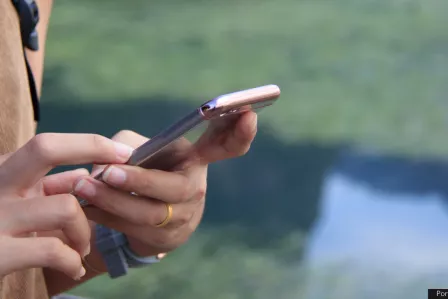Have you been blackmailed, are nude photos sent to your class, does someone ask you to do things you don't want to do, or do you just have some questions about online safety? It's always good to talk to someone.

Preferably with your parent(s), educators, or another adult you trust. This might not be easy, as you could feel ashamed or don't want to upset the adults around you. Still, it's important to talk. It can provide relief and adults can help you.
NB: it is important that you talk to an adult person. This could be a parent, but also someone else. It's about choosing an adult person that you trust. Think of an uncle, aunt or grandmother with whom you have a good relationship, an older sister or brother, a teacher, confidant at school or maybe even your doctor. You don't have to solve it alone.
5 tips for talking about online abuse:
- Choose the right time to talk - Make sure there is enough time and few distractions during the conversation. It may help to bring up the conversation while engaged in a different activity, such as during dinner or in the car.
- Start by saying how you feel - You could start off by saying that you find it difficult to talk about, that you are embarrassed or that you are afraid of their reaction.
- Give them time to process - It could be that the person is so worried that he or she reacts sad or angrily at first. Remember that this is human and that an emotional reaction is normal, this shall also pass. Most parents and educators want their children to be honest. This means they will probably be thankful and proud that you did tell them.
- Remember there is a generational gap between you and an adult - For adults, the online world of children can sometimes be difficult to understand. So you may need to explain to them a little more about how it works. The ideas they have about online contacts or online sexuality may also be different from yours, or those of your friends. That's okay.
- Write it down - Do you find having an actual conversation too much? Then write it down. You can send a letter or a (long) app. Then you can always talk about it later, in real life.
This content is from the “You Can Make It Stop-campaign” and has also been published on the Helpwanted website.
More information
Find out more about the work of the Dutch Safer Internet Centre, including its awareness raising, helpline, hotline and youth participation services – or find similar information for Safer Internet Centres throughout Europe.
Have you been blackmailed, are nude photos sent to your class, does someone ask you to do things you don't want to do, or do you just have some questions about online safety? It's always good to talk to someone.

Preferably with your parent(s), educators, or another adult you trust. This might not be easy, as you could feel ashamed or don't want to upset the adults around you. Still, it's important to talk. It can provide relief and adults can help you.
NB: it is important that you talk to an adult person. This could be a parent, but also someone else. It's about choosing an adult person that you trust. Think of an uncle, aunt or grandmother with whom you have a good relationship, an older sister or brother, a teacher, confidant at school or maybe even your doctor. You don't have to solve it alone.
5 tips for talking about online abuse:
- Choose the right time to talk - Make sure there is enough time and few distractions during the conversation. It may help to bring up the conversation while engaged in a different activity, such as during dinner or in the car.
- Start by saying how you feel - You could start off by saying that you find it difficult to talk about, that you are embarrassed or that you are afraid of their reaction.
- Give them time to process - It could be that the person is so worried that he or she reacts sad or angrily at first. Remember that this is human and that an emotional reaction is normal, this shall also pass. Most parents and educators want their children to be honest. This means they will probably be thankful and proud that you did tell them.
- Remember there is a generational gap between you and an adult - For adults, the online world of children can sometimes be difficult to understand. So you may need to explain to them a little more about how it works. The ideas they have about online contacts or online sexuality may also be different from yours, or those of your friends. That's okay.
- Write it down - Do you find having an actual conversation too much? Then write it down. You can send a letter or a (long) app. Then you can always talk about it later, in real life.
This content is from the “You Can Make It Stop-campaign” and has also been published on the Helpwanted website.
More information
Find out more about the work of the Dutch Safer Internet Centre, including its awareness raising, helpline, hotline and youth participation services – or find similar information for Safer Internet Centres throughout Europe.
- < Previous article
- Next article >












